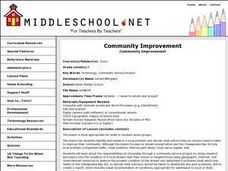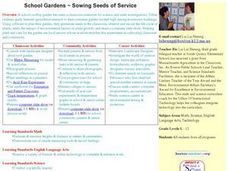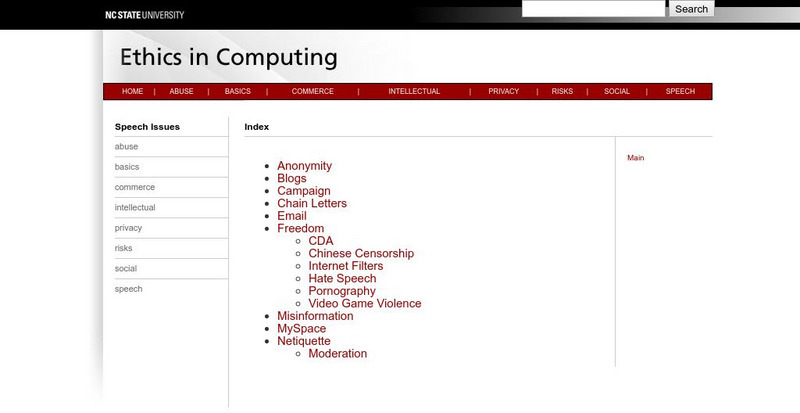Curated OER
I Have a Dream
Students use flip video cameras to film a speech about the 'I Have a Dream' speech. In this poetry and speech lesson, students listen to the speech from Dr. Martin Luther King Jr. Students memorize part of the speech.
Curated OER
Famous Americans
Students investigate famous Americans. In this American history and research lesson, students choose a famous American to research, collect information from a variety of sources, and create a related PowerPoint presentation.
Curated OER
Using Facebook with Literature
Students use online social networking to learn about characters in literature. For this literature and technology lesson, students visit Facebook website and set up character profiles for a piece of literature they've read.
Curated OER
Community Improvement
Young scholars examine a local body of water to determinet the health of its ecosystem and monitor it during the year. If needed they write a report on any conditions that need improvement including photographs and relevant data.
Curated OER
The U.S. Constitution: Practical Application of the Amendments
High schoolers create their own HyperStudio cards which include scanned images of at least one member (designated reader) of each group. They add the text of a predetermined amendment. The designated reader then reads the selected...
Curated OER
Sowing Seeds of Service
Third graders use metric measuring for model and actual plan in designing a roof garden. They photograph the process, record results in a journal, and plant seedlings in small containers. Finally, 3rd graders complete an acid rain...
Other
Albion: The Core Rules of Netiquette
Excerpts from the book "Netiquette" which gives etiquette rules for using the Internet. Ten rules with explanations are presented.
Other
Cpsr: Netiquette Training Whose Responsibility?
CPSR offers an article on the need to train new Internet users about netiquette. Includes experiences with E-mail, need for netiquette, and additional resources.
Other
Albion.com: Netiquette Home Page
A thorough netiquette guide to keep you from social communication blunders in your email messages. Includes a quiz.
Learn My Way
Learn My Way: Using a Computer
In this online course students will learn about the basic functions and different parts of a computer and how to use one safely.
Code.org
Code.org: Cs Fundamentals: Course D
Students develop their understanding of loops, conditionals, and events. Beyond coding, students learn about digital citizenship.
Other
Computer Knowledge: Computer Knowledge Virus Tutorial
This site contains a tutorial which includes an overview of viruses, types of viruses, the history of viruses, and virus prevention.
Common Sense Media
Common Sense Media: Cyber Smart! Student Curriculum Lesson: Can You Hack It? [Pdf]
Students learn that computers and electronic files are property and explore the reasons for, consequences, and ethics of teen hacking. This ISTE-aligned lesson plan for Grades 6-8 includes student activity and Home Connection sheets....
Science Education Resource Center at Carleton College
Serc: The Digital Divide: A Data Analysis Activity Using Subtotals
A lesson plan that includes a PowerPoint learning module for students. The purpose of the lesson is to teach how to use Excel to analyze a large amount of data, in this case from the US Census. The example being used is the accessibility...
Code.org
Code.org: Cs Fundamentals: Course B
Learn the basics of computer science and internet safety. At the end of the course, create your very own game or story you can share.
Other
Symantec Corporation: Symantec Security Center
An information resource on threats to computer security, how to identify and report viruses, up-to-date articles on computer system vulnerabilities, etc.
Get Safe Online
Get Safe Online: Use a Firewall
Firewall software forms the first line of defense against hackers and certain types of computer viruses. This site explains what a firewall can do to help secure a computer and what it cannot do. The site also discusses different types...
Code.org
Code.org: Cs Fundamentals: Course A
Learn the basics of computer science and internet safety. At the end of the course, create your very own game or story you can share.
University of Hawai'i
University of Hawaii: Network Etiquette
This site is provided for by the University of Hawaii. Information on network etiquette with information on not sending chain mail, spamming, and other Usenet inappropriate uses.
Code.org
Code.org: Cs Fundamentals: Course C
Create programs with sequencing, loops, and events. Translate your initials into binary, investigate different problem-solving techniques, and learn how to respond to cyberbullying. At the end of the course, create your very own game or...
NC State University
North Carolina State University: Ethics in Computing: Speech Issues
Curated collection of links to articles, essays, and related topics on responsible use of the Internet and information technologies with respect to speech and online hate compiled and maintained by a university instructor.


















